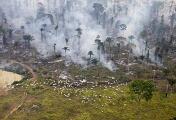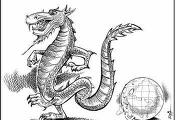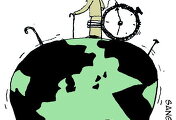[기고]국제 사회, 버마 선거에 관심을
우리는 23년 만에 처음으로 버마 선거를 앞두고 있으며, 이는 축하해마지 않을 일이다. 하지만 불행히도 버마 국민 5500만명은 여전히 군부정권의 탄압과 비참한 빈곤에 시달리고 있다. 이번 선거가 군부정권을 영속하는 위장 선거에 그치지 않기를 바란다.
이번 주 벨기에 브뤼셀 아시아·유럽 정상회의(ASEM)에서 영국은 버마 국민들에 대한 학대에 대항해 한목소리를 낼 것을 촉구했다.
이번 선거는 자유롭거나 정당하지 못할 것이 명백하며, 집권당에 반대하는 당들은 현 정권의 조직적인 방해에 직면하게 될 것이다. 현재 버마에는 수천명의 정치범이 수감돼 있으며, 다양한 민족 정당들은 그 권리를 박탈당해 왔다. 지난달 군부정권은 자신들이 가장 큰 위협으로 여겨온 정당 민주주의민족동맹(NLD)을 해산시켰다.
선거에 참여할 수 있는 정당들의 상황은 그나마 나은 편이다. 버마 집권당은 부당한 선거법을 통과시켰고 선거위원회를 출범시켰다. 버마의 모든 매체들이 국가에 의해 심하게 검열당하고 있음은 물론이다.
선거 결과는 이미 정해져 있는 것이나 마찬가지다. 의석의 4분의 1은 현재 버마 헌법에 의해 군부정권이 독식하고 있다. 남은 의석의 절반은 선거 결과에 관계없이 정권에 충성하는 정당에 할당되어 있다. 이 정권은 투표 전에 이미 과반 의석을 확보하는 것이다.
군부정권 압박 개선 이뤄지게
이런 선거 결과는 그동안 독단적 구금, 강제 납치, 강간, 고문과 같은 인권 침해를 주도해온 지배 엘리트들에게 다시 힘을 실어주게 된다. 군부정권은 또 엄청난 경제적 실패와 부패에 대한 책임이 있다. 그들은 취약한 개발을 각종 제재 탓으로 돌리곤 하지만 진실은 버마의 자원과 수출 기회를 낭비한다는 것이다. 버마의 유아 사망률은 아시아에서 가장 높은 편에 속한다.
이러한 실패는 부인할 수 없다. 하지만 일부는 다가올 선거에서 이러한 잘못들에 대해 눈감으려 하고 있다. 국제사회는 어떤 선거든 아예 치르지 않는 것보다 낫다는 데 조용히 동의하는 것이 더 편할 수도 있다. 또 다른 나라 문제에 관여해서는 안 된다고 주장할 수 있다. 이렇게 함으로써 서구 국가들은 자신들이 구축한 이미지에 맞춰 다른 나라를 개조하려 한다는 비난에서 자유로울 수 있을 것이다.
이 때문에 진실이 무시돼서는 안 된다. 유럽연합(EU)은 실질적인 진전이 이뤄질 때까지 버마 군부정권 및 경제에 대한 제재 조치를 분명히 했다. 이제 우리는 총체적인 영향력을 발휘해 개선이 이뤄질 수 있도록 아시아 파트너 국가들과 협력해야 한다. 전 인구의 약 60%를 구성하는 ASEM 회원국들은 글로벌 무역에서도 비슷한 비중을 차지하고 있다. 버마 군부정권은 국제사회의 요구를 받아들이지 않으면 유럽 또는 아시아 어느 곳에서도 인정받지 못할 것이다.
이는 공통의 도덕적 의무이기도 하지만 각자의 전략적인 이익과도 직결되는 문제다. 버마의 내부적인 화해가 이뤄지지 않는다면 불안정의 위험은 현실로 다가올 것이다. 소수민족 간 휴전은 더 어려워지고 있으며, 분쟁은 지역의 안보를 저해하고, 이웃국가로의 난민 유입은 더욱 늘어나게 될 것이다.

아웅산 수치 등 양심수 석방 요구
따라서 우리는 모든 반대 정당과 소수민족들이 의미 있는 대화에 참여할 수 있도록 군부정권을 계속 압박해야 한다. 버마의 소수민족들이 정치적인 목소리를 내고 소수의 권리를 보호할 수 있도록 하는 공정한 조치가 그 목적이 돼야 한다. 아웅산 수치 여사를 포함, 모든 양심수들은 즉각 석방돼야 한다. 버마에서는 오랜 기간 사회적·경제적 발전을 향한 화해가 이뤄지지 못했다.
ASEM은 아시아와 유럽 국가들이 버마에 대한 메시지를 다시 한 번 확인하는 기회였다. 군부정권은 군복을 정장으로 갈아입는다고 해서 국제사회의 요구가 바뀌는 것이 아니라는 점을 분명히 알아야 할 것이다. 우리는 민주적 허울에 진정되지 않을 것이며, 민주적 선거에 대한 기대를 낮추지 않을 것이다.
 |
| 닉 클레그 영국 부총리 |
이번 주 벨기에 브뤼셀 아시아·유럽 정상회의(ASEM)에서 영국은 버마 국민들에 대한 학대에 대항해 한목소리를 낼 것을 촉구했다.
이번 선거는 자유롭거나 정당하지 못할 것이 명백하며, 집권당에 반대하는 당들은 현 정권의 조직적인 방해에 직면하게 될 것이다. 현재 버마에는 수천명의 정치범이 수감돼 있으며, 다양한 민족 정당들은 그 권리를 박탈당해 왔다. 지난달 군부정권은 자신들이 가장 큰 위협으로 여겨온 정당 민주주의민족동맹(NLD)을 해산시켰다.
선거에 참여할 수 있는 정당들의 상황은 그나마 나은 편이다. 버마 집권당은 부당한 선거법을 통과시켰고 선거위원회를 출범시켰다. 버마의 모든 매체들이 국가에 의해 심하게 검열당하고 있음은 물론이다.
선거 결과는 이미 정해져 있는 것이나 마찬가지다. 의석의 4분의 1은 현재 버마 헌법에 의해 군부정권이 독식하고 있다. 남은 의석의 절반은 선거 결과에 관계없이 정권에 충성하는 정당에 할당되어 있다. 이 정권은 투표 전에 이미 과반 의석을 확보하는 것이다.
군부정권 압박 개선 이뤄지게
이런 선거 결과는 그동안 독단적 구금, 강제 납치, 강간, 고문과 같은 인권 침해를 주도해온 지배 엘리트들에게 다시 힘을 실어주게 된다. 군부정권은 또 엄청난 경제적 실패와 부패에 대한 책임이 있다. 그들은 취약한 개발을 각종 제재 탓으로 돌리곤 하지만 진실은 버마의 자원과 수출 기회를 낭비한다는 것이다. 버마의 유아 사망률은 아시아에서 가장 높은 편에 속한다.
이러한 실패는 부인할 수 없다. 하지만 일부는 다가올 선거에서 이러한 잘못들에 대해 눈감으려 하고 있다. 국제사회는 어떤 선거든 아예 치르지 않는 것보다 낫다는 데 조용히 동의하는 것이 더 편할 수도 있다. 또 다른 나라 문제에 관여해서는 안 된다고 주장할 수 있다. 이렇게 함으로써 서구 국가들은 자신들이 구축한 이미지에 맞춰 다른 나라를 개조하려 한다는 비난에서 자유로울 수 있을 것이다.
이 때문에 진실이 무시돼서는 안 된다. 유럽연합(EU)은 실질적인 진전이 이뤄질 때까지 버마 군부정권 및 경제에 대한 제재 조치를 분명히 했다. 이제 우리는 총체적인 영향력을 발휘해 개선이 이뤄질 수 있도록 아시아 파트너 국가들과 협력해야 한다. 전 인구의 약 60%를 구성하는 ASEM 회원국들은 글로벌 무역에서도 비슷한 비중을 차지하고 있다. 버마 군부정권은 국제사회의 요구를 받아들이지 않으면 유럽 또는 아시아 어느 곳에서도 인정받지 못할 것이다.
이는 공통의 도덕적 의무이기도 하지만 각자의 전략적인 이익과도 직결되는 문제다. 버마의 내부적인 화해가 이뤄지지 않는다면 불안정의 위험은 현실로 다가올 것이다. 소수민족 간 휴전은 더 어려워지고 있으며, 분쟁은 지역의 안보를 저해하고, 이웃국가로의 난민 유입은 더욱 늘어나게 될 것이다.

Detained opposition leader Aung San Suu Kyi's lawyer Nyan Win talks to reporters
outside the High Court building in Yangon. (AFP)
아웅산 수치 등 양심수 석방 요구
따라서 우리는 모든 반대 정당과 소수민족들이 의미 있는 대화에 참여할 수 있도록 군부정권을 계속 압박해야 한다. 버마의 소수민족들이 정치적인 목소리를 내고 소수의 권리를 보호할 수 있도록 하는 공정한 조치가 그 목적이 돼야 한다. 아웅산 수치 여사를 포함, 모든 양심수들은 즉각 석방돼야 한다. 버마에서는 오랜 기간 사회적·경제적 발전을 향한 화해가 이뤄지지 못했다.
ASEM은 아시아와 유럽 국가들이 버마에 대한 메시지를 다시 한 번 확인하는 기회였다. 군부정권은 군복을 정장으로 갈아입는다고 해서 국제사회의 요구가 바뀌는 것이 아니라는 점을 분명히 알아야 할 것이다. 우리는 민주적 허울에 진정되지 않을 것이며, 민주적 선거에 대한 기대를 낮추지 않을 것이다.
번역|주한 영국대사관
<닉 클레그 영국 부총리>
UK DEPUTY PRIME MINISTER NICK CLEGG ON BURMA
We are now a month away from the first elections in Burma in 23 years. That should give us cause to celebrate. Sadly, that is wishful thinking. Burma's 55 million people continue to suffer brutal oppression. Abject, needless poverty is, for most, a daily reality. These elections will be little more than a sham to perpetuate military rule.
So when Asian and European leaders meet this week in Brussels, the UK will be calling for us to speak with one voice against the gross mistreatment of the Burmese people.
That means being unequivocal: these elections will be neither free nor fair. Opponents of the ruling party lack resources and are systematically targeted by the current regime. Thousands of political prisoners remain incarcerated. Various ethnic parties have been refused the right to stand. Last month the military dissolved the National League for Democracy - its biggest perceived theat.
The situation is little better for those parties which are being allowed to participate. The regime they oppose has passed deeply unfair election laws and runs the election commission. In Burma all media is heavily censored by the state.
So the election result is a foregone conclusion. Under the constitution a quarter of seats are already reserved for the military. In half of the remaining seats parties loyal to the regime will run uncontested, their opponents unable to field a candidate. The regime is therefore guaranteed a substantial majority - before a single vote is even cast.
The consequence for Burma is the return to power of a ruling elite that has presided over widespread human rights abuses, including arbitrary detentions, enforced disappearances, rape and torture. That same regime has been guilty of profound economic mismanagement and corruption. While they routinely blame sanctions for weak development, the truth is that they have squandered Burma's natural resources and export opportunities. The country's infant mortality rate is now amongst the highest in Asia.
These failings are undeniable. Yet some are tempted to overlook the deep flaws in the upcoming election. Clearly, it would be more convenient for the international community to quietly agree that any election is better than no election. Burma would recede in the mind, allowing us to "move on". That is attractive for nations who insist we should not interfere in each others' affairs. And the West could not be accused, as it sometimes is, of attempting to recreate the world in its own image.
These are not reasons to ignore the truth. The EU has already made it clear that sanctions - targeted at the regime and its sources of revenue - will not be lifted until genuine progress is made on the ground. We must now work with our Asian partners, using our collective clout, to push for that progress. ASEM members account for nearly 60% of the global population - and the same proportion of global trade. Burma's military regime should know that, until it satisfies international demands, it will meet the same disapproval whether it looks East or West.
Not only is that our shared moral duty, but it is in our strategic self--interest too. Without a process of national reconciliation in Burma, the risk of instability is real. Ethnic ceasefires look increasingly fragile. A return to conflict would have devastating humanitarian consequences, undermining regional security and leading to further refugee flows into neighbouring countries and beyond.
So we must continue to exert pressure on the regime to engage all opposition and ethnic groups in a meaningful dialogue. The objective must be a fair settlement that gives ethnic groups a political voice and protects their minority rights. All prisoners of conscience - including opposition leader Aung San Suu Kyi - must be released without delay. Reconciliation must be geared towards the social and economic development that has long evaded the Burmese state.
This week is an opportunity for Asian and European nations to reaffirm that message. Military men must know that swapping their uniforms for suits will not change the demands of the international community. We will not be pacified by a democratic facade. Our expectations will not drop.
We are now a month away from the first elections in Burma in 23 years. That should give us cause to celebrate. Sadly, that is wishful thinking. Burma's 55 million people continue to suffer brutal oppression. Abject, needless poverty is, for most, a daily reality. These elections will be little more than a sham to perpetuate military rule.
So when Asian and European leaders meet this week in Brussels, the UK will be calling for us to speak with one voice against the gross mistreatment of the Burmese people.
That means being unequivocal: these elections will be neither free nor fair. Opponents of the ruling party lack resources and are systematically targeted by the current regime. Thousands of political prisoners remain incarcerated. Various ethnic parties have been refused the right to stand. Last month the military dissolved the National League for Democracy - its biggest perceived theat.
The situation is little better for those parties which are being allowed to participate. The regime they oppose has passed deeply unfair election laws and runs the election commission. In Burma all media is heavily censored by the state.
So the election result is a foregone conclusion. Under the constitution a quarter of seats are already reserved for the military. In half of the remaining seats parties loyal to the regime will run uncontested, their opponents unable to field a candidate. The regime is therefore guaranteed a substantial majority - before a single vote is even cast.
The consequence for Burma is the return to power of a ruling elite that has presided over widespread human rights abuses, including arbitrary detentions, enforced disappearances, rape and torture. That same regime has been guilty of profound economic mismanagement and corruption. While they routinely blame sanctions for weak development, the truth is that they have squandered Burma's natural resources and export opportunities. The country's infant mortality rate is now amongst the highest in Asia.
These failings are undeniable. Yet some are tempted to overlook the deep flaws in the upcoming election. Clearly, it would be more convenient for the international community to quietly agree that any election is better than no election. Burma would recede in the mind, allowing us to "move on". That is attractive for nations who insist we should not interfere in each others' affairs. And the West could not be accused, as it sometimes is, of attempting to recreate the world in its own image.
These are not reasons to ignore the truth. The EU has already made it clear that sanctions - targeted at the regime and its sources of revenue - will not be lifted until genuine progress is made on the ground. We must now work with our Asian partners, using our collective clout, to push for that progress. ASEM members account for nearly 60% of the global population - and the same proportion of global trade. Burma's military regime should know that, until it satisfies international demands, it will meet the same disapproval whether it looks East or West.
Not only is that our shared moral duty, but it is in our strategic self--interest too. Without a process of national reconciliation in Burma, the risk of instability is real. Ethnic ceasefires look increasingly fragile. A return to conflict would have devastating humanitarian consequences, undermining regional security and leading to further refugee flows into neighbouring countries and beyond.
So we must continue to exert pressure on the regime to engage all opposition and ethnic groups in a meaningful dialogue. The objective must be a fair settlement that gives ethnic groups a political voice and protects their minority rights. All prisoners of conscience - including opposition leader Aung San Suu Kyi - must be released without delay. Reconciliation must be geared towards the social and economic development that has long evaded the Burmese state.
This week is an opportunity for Asian and European nations to reaffirm that message. Military men must know that swapping their uniforms for suits will not change the demands of the international community. We will not be pacified by a democratic facade. Our expectations will not drop.
<닉 클레그 영국 부총리>
반응형
'경향 국제칼럼' 카테고리의 다른 글
| 이집트 혁명은 한국사회와 무관한 것인가? (0) | 2011.02.25 |
|---|---|
| [국제칼럼]무엇이 아마존을 절망케 하는가 (0) | 2011.02.14 |
| [경향의 눈]대중국 외교의 반성문 (0) | 2010.11.30 |
| 시진핑 선장의 ‘중국호’와 한·중 관계 (0) | 2010.10.21 |
| 지구촌 '노인 인구폭탄' 어떤 영향 미칠까 (0) | 2010.10.15 |




댓글